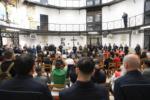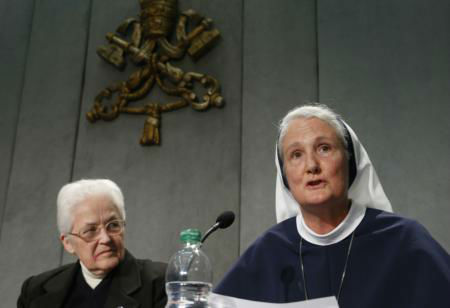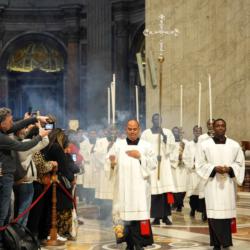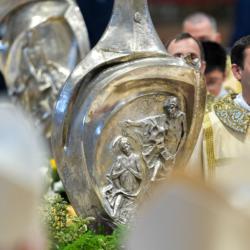Though painful at times, visitation was positive, speakers say
VATICAN CITY (CNS) -- The apostolic visitation of U.S. communities of religious women, though initially met with some resistance, ended up promoting a greater sense of unity in the church and helped the women become more aware of how God is working in their lives, said the prefect of the Congregation for Institutes of Consecrated Life and Societies of Apostolic Life.
"May the self-assessment and dialogue sparked by the apostolic visitation continue to bear abundant fruit for the revitalization and strengthening of religious institutes in fidelity to Christ, to the Church and to their founding charisms," said Cardinal Joao Braz de Aviz, the prefect, at a Dec. 16 news conference at the Vatican.
The apostolic visitation, carried out between 2009 and 2012, concluded with the publication of a final report summarizing the problems and challenges the apostolic visitors and the women themselves see in their communities.
Joining Cardinal Braz de Aviz for the presentation of the report were: Archbishop Jose Rodriguez Carballo, congregation secretary; Mother Mary Clare Millea, superior general of the Apostles of the Sacred Heart of Jesus and the apostolic visitor appointed by the Vatican; Mother Agnes Mary Donovan, superior general of the Sisters of Life and chairperson of the Council of Major Superiors of Women Religious; and Sister Sharon Holland, vice president of the Servants of the Immaculate Heart of Mary and president of the Leadership Conference of Women Religious.
The sisters attended Pope Francis' private Mass that morning and spoke to him briefly afterward. Mother Clare said the pope thanked her for fulfilling the "long and arduous task." She asked the pope if he had a message for the U.S. sisters and he responded, "Please tell them I send my blessings to them all."
Mother Clare, speaking to Catholic News Service, said one thing she kept in mind during the visitation was the experience of her order's founder, Mother Clelia Merloni. Because of "internal conflicts and jealousies," she was denounced to the Vatican. "She was subjected to an apostolic visitation, removed from office and lived outside the congregation for 12 years." Now "we are very close to her beatification," Mother Clare said.
Her suffering "very deeply touched my approach to the visitation," she said, "knowing the sacredness of every sister, the sacredness of every congregation, so I could not treat them with anything but total respect."
In addition to the 5,000-word final report, Cardinal Braz de Aviz said, "individual reports will be sent to those institutes which hosted an onsite visitation and to those institutes whose individual reports indicated areas of concern -- because there are some of those, too."
Archbishop Rodriguez told reporters that the Vatican would not publish the individual reports out of respect for the communities involved.
Mother Millea, who said she initially was "overwhelmed" by the "enormous task" of conducting the visitation, told reporters, "I now understand as never before how enriched and blessed the church in the United States is because of the myriad experiences and gifts of its current 50,000 women religious and the multitudes of dedicated women who have preceded us."
Her voice breaking with emotion, Mother Millea thanked the congregation leaders "for hearing our voices, our concerns and our goodwill, and for responding to us with sensitivity, respect and clarity. Your message to us today shows that you do understand our ongoing struggle to faithfully serve the church in challenging times, despite our shortcomings and limitations."
Sister Holland told reporters that the expressed purpose of the visitation when it began -- "to look into the quality of life of religious women in the United States" -- "was troubling. Some congregations reported that their elder sisters felt that their whole lives had been judged and found wanting."
However, she said, the final report is "affirmative and realistic," reflecting the vast range of experiences of U.S. communities of women religious and the complex social, religious and economic factors that have contributed to the declining number of sisters in the United States, their financial difficulties and their struggles to discern how best to organize their ministries as well as their community life.
Responding to a question, she said she worries about those sisters who are still angry that the visitation took place, but they need someone to listen to them. "It is not healthy to remain angry," she said. "Sometimes when we are fearful and feel powerless, we externalize that in anger."
Archbishop Rodriguez said the congregation hopes U.S. religious communities "recognize themselves" in the final report and that it will help them in the future, including as they continue to reflect on ways to attract new members.
The report noted that "the current number of approximately 50,000 apostolic women religious is a decline of about 125,000 since the mid-1960s." And, it said, while all the orders have invested time and money in vocations promotion, most have not seen an increase in membership.
"However," Sister Holland said, "the report goes on to recognize that the vocational peak of the 1960s was unusual, and not a norm to which we can return. Rather, the focus is on providing the formation needed for today's candidates who often are highly qualified professionally, but lacking in theological formation."
Mother Agnes told reporters that while communities whose superiors belong to the Council of Major Superiors of Women Religious share many traits with those belonging to the Leadership Conference of Women Religious, their average age is much younger and membership continues to grow.
The call the new members "have experienced interiorly is to separate themselves" from the world "in order to serve it with and from the heart of Christ," she said. "They want to be externally recognizable as tender mothers in the church -- so they can be found and approached at any moment, in any circumstance, with confidence, by the poor and needy who are often hidden on the margins of society or in the darkness of fear."



















